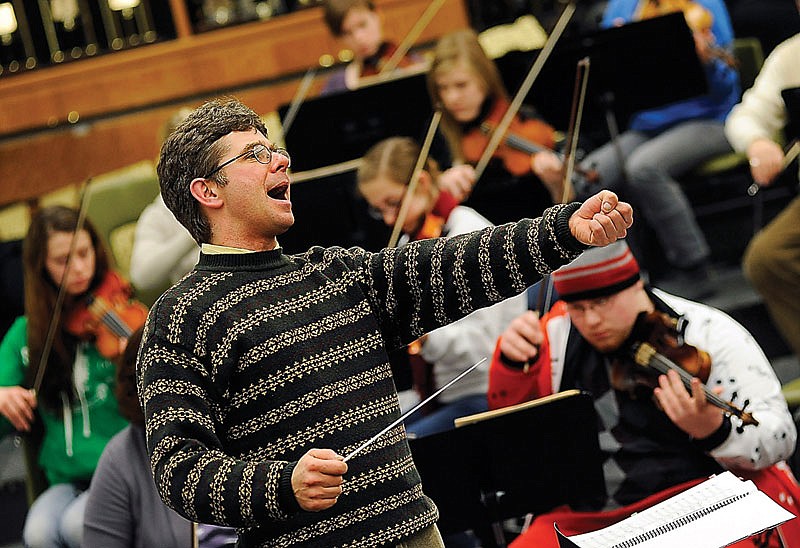As the newest conductor of the Jefferson City Symphony Orchestra, Patrick David Clark sees the task before him as translating the musical notes from "math code" into "musical expression."
Clark returned to Columbia in 2010 to study with Edward Dolbashian, the conductor of the University of Missouri Philharmonic Orchestra, to earn a second master's degree in conducting.
"Mainly I come into the capacity of conductor from the point of view of a composer," he said.
Although he is delighted to be conducting, Clark's first love is composition and he has sold some of his pieces, including a fanfare the Illinois Symphony commissioned for the opening of their 2012-13 season and a selection used in a film that won first place at the Duke City Shootout film festival.
While his approach is clearly intellectual, he strives not to be pretentious. "My real love of music came from the Beatles and Led Zeppelin," he said. "I love that music so much. Whether you're listening to Rachmaninov or Zeppelin, the same principals are at play."
Clark never tells the orchestra what a particular piece of music means. "Instead I'm trying to provoke their own understanding of the music," he said.
While he may not hold an instrument in his hands, he feels, as conductor, he is playing a kind of chamber music with the orchestra.
It's up to the individual musicians to master the musical notes and work out the technical issues of their various parts.
"I don't know how to play the flute or the oboe or the timpani. What I do know is where the part belongs and what it's going to say when it gets there," he said.
Clark said successful musicians must "hear the color" of what's happening on the stage, the way a painter might subtly merge crimson into ultramarine with his brush. But instead of colors, the conductor uses musicians and their instruments. He said the microseconds where the clarinets blend into the oboes is where the magic happens. He compared the experience to synesthesia, or the understanding of one sense by experiencing another. For example certain colors, temperatures - and sounds - can each evoke a particular emotion.
"The transitions are very, very subtle," he said. "It has to be very, very carefully done."
In a young orchestra, he said, those skill are not developed. "I am not a metronome. I'm not the beat or the count. But I am conducting their ears. A conductor gives you color and musical sympathy," he said.
The difference between a truly outstanding orchestra and a less-experienced group is they way in which the musicians listen to their peers. Clark wants the players to "put as much focus into listening as they are into playing."
On April 23, Clark will be leading the orchestra as they perform Aaron Copland's "Fanfare for the Common Man" and "Lincoln Portrait." They also will play Rachmaninov's "Third Piano Concerto."
That performance will feature the 2013 Piano Concerto Competition winner Joshua Charles. "It's going to be a real pleasure to work with a pianist of his caliber," Clark said. "It's a very difficult piece, not only for the pianist, but for the orchestra. And it raises the ante for me, as well."
Although composing is Clark's first love, this is not his first act of conducting.
He led the string orchestra in Iraq through a program called "American Voices," which shares musical programs with people who live in countries emerging from conflicts.
Working with the Iraqi musicians was thrilling, he said. He used translators to communicate, but he also said many of them had a good grasp of English already. "They are some of the most engaging, kind people," he said.
Clark has contributed, as a guest conductor, to previous Jefferson City performances.
He hopes to see the orchestra flourish under his tenure. He said that will take dedication on the part of the musicians, reliable personnel and a commitment to quality rehearsals.
"I want to make this important enough to the musicians that they need to be at rehearsals and want to be at rehearsals. A musician is gratified when they play better and I am gratified when I conduct better," he said. "An orchestra is an abstract revelation of all the mathematical, cosmological and physiological aspects of life, translated into sound."
Clark, who lives in Columbia, said he was beginning to pick up the vibe that musicians and other performing artists in Jefferson City take their work seriously. "I'm discovering that core community really is there," he said.
Clark will be paid a stipend, but not a sustaining salary, for his work as conductor. The funding primarily comes from donors and state support of the arts. "They make it possible for me to do this," he said.
Clark was selected to lead the Jefferson City orchestra in late February. He is replacing Steven Hauser, who conducted the orchestra for years before he retired from the position last fall. Hauser will still be playing with the orchestra as first clarinetist.

